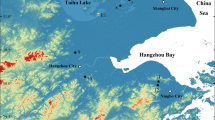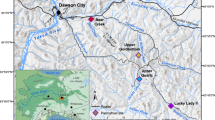Abstract
WE present pollen and phytolith evidence for maize (Zea mays L.) cultivation in lowland Ecuadorian Amazonia as early as 5,300 radiocarbon years BP (before present), equivalent to about 6,000 calendar years BP1. This date for maize cultivation is more than 2,000 years earlier than any previously reported from the Amazon basin2. Although maize has been cultivated for at least 7,000 years in Mexico3,4, the manner of its dispersal through South America is still uncertain2–6. Evidence from coastal Ecuador6 suggests that maize had been taken south across the equator by 7,000 years BP. The oldest macrofossil evidence from Ecuador, however, is from about 3,400 years BP7. Our discovery of Zea microfossils in Amazonian lake sediments from Ecuador at about 6,000 years BP suggests that maize cultivation spread into the Amazon lowlands soon after its arrival in South America.
This is a preview of subscription content, access via your institution
Access options
Subscribe to this journal
Receive 51 print issues and online access
$199.00 per year
only $3.90 per issue
Buy this article
- Purchase on Springer Link
- Instant access to full article PDF
Prices may be subject to local taxes which are calculated during checkout
Similar content being viewed by others
References
Pearson, G. W., Pilcher, J. R., Baillie, M. G., Corbett, D. M. & Qua, F. Radiocarbon 28, 911–934 (1986).
Roosevelt, A. C. Parmana: Prehistoric Maize and Manioc Subsistence Along the Amazon and Orinoco (Academic, New York, 1980).
MacNeish, R. S. in The Prehistory of the Tehuacan Valley (ed. Beyers D.) Vol. 1, 290–309 (University of Texas Press, Austin, 1967).
Beadle, G. W. in The Origins of Agriculture (ed. Reed, C. A.) 615–635 (Mouton, The Hague, 1977).
Lathrap, D. W. Ancient Ecuador: Culture, Clay and Creativity 3000–300 B.C. (Field Museum of Natural History, Chicago, 1975).
Pearsall, D. M. & D. R. Piperno Am. Antiq., in the press.
Lippi, R. N., Bird R. M., & Stemper D. M. Am. Antiq. 49, 118–124 (1984).
Bush, M. B. & Colinvaux, P. A. Vegetatio 76, 141–154 (1988).
Faegri, K. & Iversen, J. A Textbook of Pollen Analysis (Blackwell Scientific, Oxford, 1975).
Stockmarr, J. Pollen Spores 13, 615–621, (1971).
Jones, W. D. & Newell, L. C. Univ. Nebraska Agric. exp. stat. Res. Bull. 148 (1946).
Piperno, D. R. Phytolith Analysis: An Archaeological and Geological Perspective (Academic, San Diego, 1988).
Pearsall, D. M. Science 199, 177–178 (1978).
Zevallos, M. C. et al. Science 196, 385–389 (1977).
Colinvaux, P. A., Miller, M. C., Liu, K-b., Steinitz-Kannan, M. & Frost, I. Nature 313 42–45 (1985).
Salo, J. et al. Nature 322, 254–258 (1986).
Fiedel, S. J. Prehistory of the Americas (Cambridge University Press, 1987).
Hubbel, S. P. Science 203, 1299–1309 (1979).
Author information
Authors and Affiliations
Rights and permissions
About this article
Cite this article
Bush, M., Piperno, D. & Colinvaux, P. A 6,000 year history of Amazonian maize cultivation. Nature 340, 303–305 (1989). https://doi.org/10.1038/340303a0
Received:
Accepted:
Issue Date:
DOI: https://doi.org/10.1038/340303a0
This article is cited by
-
Fifty Years Later—The Legacy of Alfred Crosby’s “The Columbian Exchange: Biological and Cultural Consequences of 1492”
Economic Botany (2023)
-
2,100 years of human adaptation to climate change in the High Andes
Nature Ecology & Evolution (2019)
-
Ecological consequences of post-Columbian indigenous depopulation in the Andean–Amazonian corridor
Nature Ecology & Evolution (2018)
Comments
By submitting a comment you agree to abide by our Terms and Community Guidelines. If you find something abusive or that does not comply with our terms or guidelines please flag it as inappropriate.



